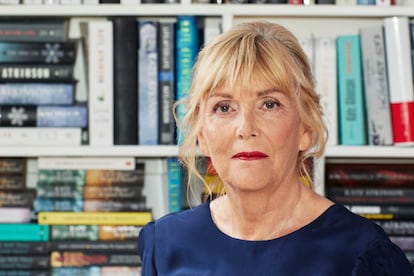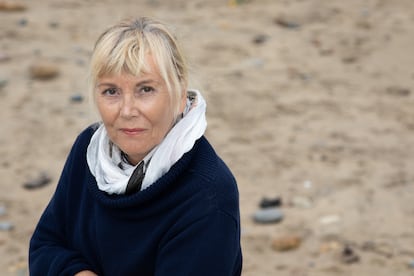Kate Atkinson, the unclassifiable bestseller: From crime fiction to the magical world of Yorkshire
The acclaimed British author, who has sold millions of books worldwide, reflects on her career and the value of giving fiction distance from contemporary issues to ensure it stands the test of time


Kate Atkinson, 73, winces in protest every time someone defines her literature as magical realism. But, the surreal world of Yorkshire in which her novels and stories unfold — where a girl dies and resurrects repeatedly in her quest to find meaning in life, or where dogs and horses converse with humans — bears a strong resemblance to the world of Gabriel García Márquez’s Macondo.
When it’s pointed out that it’s not exactly normal for a talking dog to show up, she replies, laughing: “It is in fairy tales, and in English children’s literature, which have always been my main inspiration.”
Her latest short story collection, Normal Rules Don’t Apply, was published in 2023, more than 20 years after Not The End Of The World, her first anthology of short stories. Atkinson has a particular fondness for the short story format, as it forces her to be concise and rein in her overflowing imagination.
“I am a very organic writer, I am interested in finding out where the novel is taking me. If I knew in advance everything I was going to write, I would lose the desire to write it. Although the ending is always clear to me,” she explains to EL PAÍS as she sips her American coffee in an elegant, centrally located hotel in Edinburgh, the Scottish city where she has lived for more than two decades. “There is a middle ground, I imagine, that I have not yet managed to master, in which you design a structure on paper, and you stick to it.”
Atkinson has sold more than four million copies of her books and is a revered author around the world. In the United States, she has a legion of followers. Her literature has been praised by critics as well as by contemporary authors such as Stephen King and the late Hilary Mantel, another towering figure in English literature. Mantel’s legendary article defending Atkinson in The London Review of Books (LRB) stands as a sharp rebuttal to a classist, ignorant, and condescending press that struggled to accept the late success of an unclassifiable author.
In 1995, Atkinson won the Whitbread Book Award (now known as the Costa Book Award) in the first novel category for Behind the Scenes at the Museum. Although the award for best novel of the year went to an already established author — Salman Rushdie for The Moor’s Last Sigh — all the attention was focused on the unknown 43-year-old. In tracing her past and the various jobs she held before entering the publishing world — like many male writers — the press fell into the easy trap of highlighting her brief stint as a hotel chambermaid.

The classist undertones of reviews and articles, condemned by Mantel — who was on the jury that year — in her piece for The London Review of Books, were unbearable. Even Richard Hoggart, the chairman of the committee of experts who selected the work, condescendingly noted that Atkinson “had written a postmodernist novel, but might not know it.” This, despite the fact that Atkinson had dedicated her doctoral thesis to postmodernism in American literature.
“My publisher, as surprised as I was by the award, wanted to urgently publish a biographical sketch, and asked me what jobs I had done,” Atkinson recalls with the calm and obliviousness of someone who knows that success and time have put things in their place. “My CV was like that of any other writer: I was a housekeeper, a cleaner, a student tutor… all the kinds of jobs you do during your university days. And yes, during one summer vacation, I was a hotel chambermaid. That was the only thing that interested many journalists.”
History, detectives and spies
More awards followed, and Atkinson’s prolific output spanned all genres. Many of her works were quickly adapted by the BBC, such as Once Upon a Time and A God in Ruins, where she recreates, around the idyllic country house Fox Corner, the pre-World War I England so nostalgically longed for today by confused idealists.
“It’s that golden, pre-disaster era that everyone loves. It’s E. M. Forster territory [the author of A Room with a View and A Passage to India], that sense of English middle-class security that’s suddenly gone. When you write about that period you’re aware that the comfort and stability of English society is about to go, and that makes it all the more appealing,” Atkinson explains.
Atkinson’s most popular series is the six-novel Jackson Brodie saga, which the BBC has adapted into a successful TV series. Brodie, an ex-military man, former policeman, and divorcee, is tormented by his past and endowed with immense empathy for human suffering, making him a magnet for the unfortunate. Although Atkinson has long avoided political debate in the United Kingdom, she has used the reflections of her attractive antihero to offer opinions on contemporary issues like Brexit (“the end of civilization as we know it”) or the #MeToo movement (“It was funny how so many men were defined by their downfall […] Women hardly ever. They didn’t fall down. They stood up”).
“I love fiction, and being able to keep the distance necessary to focus on my artistic work. Of course, I comment on current events, incessantly, but in my own home. Because what you want is for your novels to stand the test of time and for people to continue reading them. You have to introduce current issues, yes, but with the necessary distance to make them interesting, so that the reader does not see them as ephemeral,” explains Atkinson.
Sign up for our weekly newsletter to get more English-language news coverage from EL PAÍS USA Edition
Tu suscripción se está usando en otro dispositivo
¿Quieres añadir otro usuario a tu suscripción?
Si continúas leyendo en este dispositivo, no se podrá leer en el otro.
FlechaTu suscripción se está usando en otro dispositivo y solo puedes acceder a EL PAÍS desde un dispositivo a la vez.
Si quieres compartir tu cuenta, cambia tu suscripción a la modalidad Premium, así podrás añadir otro usuario. Cada uno accederá con su propia cuenta de email, lo que os permitirá personalizar vuestra experiencia en EL PAÍS.
¿Tienes una suscripción de empresa? Accede aquí para contratar más cuentas.
En el caso de no saber quién está usando tu cuenta, te recomendamos cambiar tu contraseña aquí.
Si decides continuar compartiendo tu cuenta, este mensaje se mostrará en tu dispositivo y en el de la otra persona que está usando tu cuenta de forma indefinida, afectando a tu experiencia de lectura. Puedes consultar aquí los términos y condiciones de la suscripción digital.








































